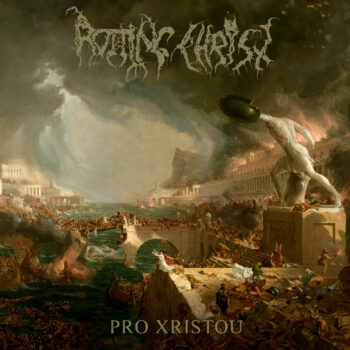Ah, Rotting Christ. The name really says it all, doesn’t it? Unadorned death and outright blasphemy, all in one Grecian package. But an evocative name isn’t the only thing that sets them apart. These Mediterranean metalers have had their nose to the grindstone for well over 31 years now, dropping their classic debut Thy Mighty Contract in 1993. Since then, Rotting Christ have bestowed upon us lowly mortals a total of 14 full-length albums, as well as a dizzying array of EPs, splits, and live releases. Yet it appears the Promethean fires continue to burn, as Sakis and Co. arrive once again to deliver their 15th album Pro Xristou on the slovenly metal masses. But how does this new platter stack up against a decidedly mixed discography?
Well, it’s nearly impossible to top 2007’s Theogonia, which, rightly or wrongly, is my basis of measurement for a Rotting Christ album. Not that I came into this expecting that exact same brand of ferocity or immediacy. Bands evolve, and Rotting Christ are no exception. Brothers Sakis and Themis Tolis remain the creative force here, and in recent years, they’ve settled into a more or less predictable groove; one which dispenses with much of their earlier, blackened fervor, in favor of more majestic melodies and gothic elements. That isn’t a bad thing, and there’s certainly something to be said for a band with as much history as Rotting Christ finding comfort down different musical avenues. On Pro Xristou, however, it would appear this comfort had bred complacency.
Pro Xristou by Rotting Christ
I don’t think the good Brothers Tomis took time to read Grymm’s grim review of their 2019 album The Heretics. Or if they did, they chose to ignore it. Many of the same issues that Grymm outlined continue to plague Pro Xristou, and none of them have grown any less troubling in the intervening years. Brief intro “Pro Xristou” and follow up “The Apostate” start off promising enough, with mid-paced chuggery, enveloping chants, RC’s trademark spoken word sections, and emotive solos that rise high above the din. But by third track “Like Father, Like Son,” things start to feel a bit repetitive. And by the fourth track “The Sixth Day,” it’s clear things just don’t feel repetitive, they are repetitive. Save for a few choice tunes (“La Lettera Del Diavolo,” “Yggdrasil”) the vast majority of the album adopts a singular, shallow framing; Tone, tempo, and timbre are both monotonous and uninspired. Even a track like “The Farewell,” which opens with an unexpected, pugnacious riff and a deep, bellowing chant quickly falls into what must be the Rotting Christ algorithmic song generator: grandiose opening devolving into a mid-paced chug, push the “maudlin solo” button, speak a phrase or two, cue recycled choral track and synths, rise to a crescendo that threatens satisfaction without ever delivering it. Rinse. Repeat. In his The Heretics review, Grymm wrote, “There is nothing on here that builds up, hits its stride, and explodes in a powder keg of glory…” And sadly, this is just as true on Pro Xristou.
But why? Why would a band that helped develop and popularize the warm, ferocious sounds of Hellenic Black metal continue to churn out such low-energy, mundane efforts? I wrote earlier that comfort can breed complacency, and I think that may also be true for the musicians you work with. While Rotting Christ have undergone multiple lineup changes, the Tolis Brothers have remained the stalwarts, driving the band’s direction since its founding in 1987. Now, with so many years as an established duo under their belts and with their roles and responsibilities so firmly entrenched, is it really a surprise that Rotting Christ have found themselves in a creative rut?
Pro Xristou is not a bad album, but it feels phoned in. It’s far from poorly performed, yet it feels passionless. Taken individually, almost any track will get your head bopping and your fist pumping. The problem, you quickly realize, is that once you’ve heard one track, you’ve more or less heard them all. This is not a new problem, nor am I the first AMG reviewer to point it out. So instead, I will offer some constructive criticism: in the face of creative stagnation, it never hurts to invite good-faith challenges to a long-held artistic vision; to internalize said feedback and hopefully arrive at a better way forward. After all, retreading old ground isn’t what first endeared Rotting Christ to their fans, and it certainly shouldn’t be how they choose to embrace the back half of their storied career.
Rating: 2.0/5.0
DR: 7 | Format Reviewed: 320 kb/s mp3
Label: Season of Mist
Websites: instagram.com/rottingchristofficial | rottingchrist.bandcamp.com/album/pro-xristou
Releases Worldwide: May 24th, 2024
Iceberg
At what point in a long-running band’s career does one stop comparing them to their younger, wilder roots and begin viewing them through a new lens? Can a band ever escape the sound that made them turn heads in the first place? These are just a few of the questions posed when another Rotting Christ album bubbles up from the sump. After back to back disappointments, Ser Grymm has fulfilled his blood oath to the Greeks; it now falls to less scarred staffers to carry the Hellenic Flame. After 14 albums and a trajectory encompassing grind, black, and symphonic metal, latest effort Pro Xristou looks to further position Rotting Christ at the vanguard of modern metal. Have they emerged from their blackened ashes a triumphant phoenix? Or is this just another uninspired entry in the morass of Arena-Oriented Rock?
The Tolis Brothers need little introduction here; they’ve been peddling their epic, blackened sound longer than some of the AMG staff have been alive. After the undeniable highlight of 2007’s Theogonia, the band steadily swapped razor-sharp black metal for a more pared down—but still menacing—melodic metal sound. Pro Xristou, or “Before Christ,” features much fans will recognize from Rituals and The Heretics: chuggy riffs from Sakis and minimalist drum patterns from his brother Themis with the occasional blast beat and tremolo making an appearance. If anything the bombastic orchestrals that are Rotting Christ’s calling card steal the show here. Pro Xristou is more firmly rooted in an AOR sound than ever before, and while this feels like the band has found surer footing, the near-total abandonment of the black metal sound carries a hefty price.
There’s no denying Pro Xristou sounds epic and mighty; indeed, most of its positive qualities are derived from this fact. Sakis has settled firmly in the role of vocalist-as-narrator, with fewer growls than on any recent album I can remember. His weapon of choice is a snarling, spoken drone, thick with his native accent (“Like Father, Like Son,” “The Sixth Day”). Melody is relegated chiefly to the lead guitars; soaring, arching melodic lines reminiscent of Insomnium or The Flesh Prevails-era Fallujah are quite catchy and anchor certain tracks (“The Apostate,” “The Sixth Day,” “Saoirse”). Rhythmic urgency is rare, but when it does pop up it offers a glimpse into what the band can do when firing on all cylinders (“La Lettera Del Diavolo,” “Yggdrasil”). Veteran engineer Jens Borgren still handles the mix on Pro Xristou, and I’ll admit this sounds roomier and more balanced than the previous two albums. But with such omnipresent, theatrical arrangements, there’s only so much post-production can do.
The unfortunate truth about Pro Xristou is that the bulk of the music on here sounds—for lack of a better word—cookie-cutter. Album opener “Pro Xristou” sets an apocalyptic scene with chants and marching rhythms, and the blasting-down-the-doors of “The Apostate” hints at a rejuvenated sound. But the songs that follow are a collection of mid-tempo dad-rock anthems, and this template comprises the bulk of the album (“Like Father, Like Son,” “Farewell”). Some of the structures here become so painfully simple, songs are comprised of only two riffs (“Pix, Lax, Dax”). There’s also the curious, and alarming, case for self-plagiarism here. The blasting that opens “The Apostate” feels lifted directly from The Heretics’ “Dies Irae.” Album highlight “La Lettera Del Diavolo” features rabid, spoken female vocals very much in the spirit of “Elthe Kyrie,” but feels like a pantomime of that masterful composition. While I do applaud Sakis’ use of storytelling in some of these tracks (“The Apostate,” “Saoirse”) they are in the minority, and the narration doesn’t bring enough teeth to this defanged version of Rotting Christ to hold my interest for repeat listens.
I’m committed to staying on the positive side of this situation. While I think 2024 Rotting Christ is finding a surer footing in their modern metal sound, the music just doesn’t seem to be at the level a band of this pedigree should be attaining. The compositions are strikingly similar, in both the riffs and the rhythms. The melodies don’t have quite enough variance to color each song differently, and the vocals are begging for some real tension and release, worthy of the name of Rotting Christ. All this gives the impression of a band going through the motions, and while there are glimmers of hope on Pro Xristou, I can’t see myself returning to this album all that much.
Rating: 2.0/5.0
The post Rotting Christ – Pro Xristou Review appeared first on Angry Metal Guy.




